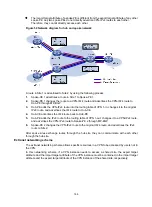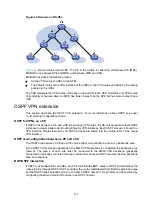
197
d.
Advertises those routes to the connected CE over a static route, RIP route, OSPF route,
IS-IS route, EBGP route, or IBGP route.
MPLS L3VPN packet forwarding
In a basic MPLS L3VPN (within a single AS), a PE adds the following information into VPN packets:
•
Outer
tag
—Identifies the public tunnel from the local PE to the remote PE. The public tunnel
can be an LSP, an MPLS TE tunnel, or a GRE tunnel. Based on the outer tag, a VPN packet can
be forwarded along the public tunnel to the remote PE. For a GRE public tunnel, the outer tag is
the GRE encapsulation. For an LSP or MPLS TE tunnel, the outer tag is an MPLS label.
•
Inner
label
—Identifies the remote VPN site. The remote PE uses the inner label to forward
packets to the target VPN site. MP-BGP advertises inner labels for VPN-IPv4 routes among
PEs.
Figure 50 VPN packet forwarding
As shown in
, a VPN packet is forwarded from Site 1 to Site 2 by using the following
process:
1.
Site 1 sends an IP packet with the destination address 1.1.1.2. CE 1 transmits the packet to PE
1.
2.
PE 1 performs the following operations:
a.
Finds the matching VPN route based on the inbound interface and destination address of
the packet.
b.
Labels the packet with both the inner label and the outer tag.
c.
Forwards the packet to the public tunnel.
3.
P devices forward the packet to PE 2 by the outer tag.
If the outer tag is an MPLS label, the label is removed from the packet at the penultimate hop. If
the outer tag is GRE encapsulation, PE 2 removes the GRE encapsulation.
4.
PE 2 performs the following operations:
a.
Uses the inner label to find the matching VPN instance to which the destination address of
the packet belongs.
b.
Looks up the routing table of the VPN instance for the output interface.
c.
Removes the inner label and forwards the packet out of the interface to CE 2.
5.
CE 2 transmits the packet to the destination through IP forwarding.
When two sites of a VPN are connected to the same PE, the PE directly forwards packets between
the two sites through the VPN routing table without adding any tag or label.
For more information about GRE, see
Layer 3—IP Services Configuration Guide
.
CE 1
Site 1
PE 1
P
P
PE 2
CE 2
Site 2
2.1.1.1/24
1.1.1.2/24
1.1.1.2
1.1.1.2
Inner label
Outer tag
1.1.1.2
Inner label
1.1.1.2
MPLS network
















































